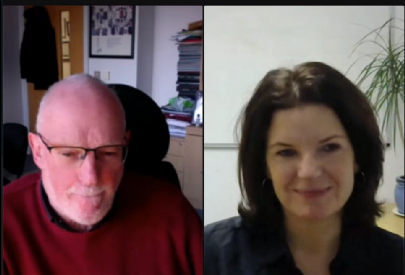On December 8th, 2020, Prof. Pat Dolan and Dr. Bernadine Brady got together with European Center for Evidence Based Mentoring to share more about their research and findings on how to become better mentors to the youth – a topic highly requested by participants at the 2020 European Mentoring Summit. Two of our students, Teodora Bunkova and Anna Jambor developed the following summary of the webinar on Reflections on the Importance of Relationships in Youth Mentoring.
Prof. Dolan and Dr. Bernadine expressed a desire to invoke thoughts on the three core components of mentoring relationships – coping and resilience; social support and empathy. Furthermore, the role and the benefits of a presence mentor were highlighted and proven by showcasing the outcomes of a study undergone with mentees. Lastly, Relational-Cultural Theory (RCT) has given more awareness to how the relationships built in life are central and one of the most important factors for well-being.
When it comes to coping and resilience, the core function of the friendship between the mentor and mentee is to support coping and enable resilience. Resilience, in the words of Professor Dolan, is the flower of coping – once you are able to cope with the situations in your life you build your resilience.
Empathy is another highly important factor, the mentors are present practitioners who provide time, listening and affirmation – they are not problem-oriented but instead offer guidance and social support. Empathy is also key to giving connectedness in and out of the relationship. The feeling of belongingness and social connectedness is the positive outcome of social support and empathy coming from a mentor.
A recent study, undergone with 13 participants from a background of foster or residential care, held in-depth interviews with the topic of what mentoring is meant for them, what value do they hold with it, and how it has changed their lives. It revealed that young people experienced stress, addiction, violence in accordance to family breakdown, multiple moves, and migration. They also shared experiencing emotional issues such as separation, loss, and trauma which led to anger, stress, loneliness, lesser confidence, and failure in completing their schoolwork. It proved challenging to cope with all of them due to the lack of a person to confide in and trust with these issues.
This is where mentors step in to guide the mentees with resources and coping strategies.
According to Erica Frydenberg’s book, coping is the ability to deal with stress factors and circumstances. To succeed, young people rely on parental and family support, social networks, school connectedness, relaxation, recreation, expressing emotions, and a positive sense of agency. On the opposite spectrum, coping is undermined by bad family relationships, conflicts, difficulty with connectedness, bottling this up, and bad mindset, negative outlook: it leads to bad emotional well-being and depression.
Mentoring is helped by the presence of someone to offer support and empathy.
Communities, sports, and youth groups help in repairing disconnections from school and stress relief. An important factor to coping is developing new habits and a change of mindset, coaching, and giving strategies to manage emotions, relaxation and leisure. When receiving a positive sense of agency from mentors, rising ambitions, and dealing with the past through talking about fears and emotional blocks, mentees show an outcome of enhanced coping, social engagement, and emotional well-being.
The Relational-Cultural Theory (RCT) implies similar findings – when a lack of social connections appears, youth tends to display depression, confusion, self-blame, and withdrawal. Positive growth occurs in relationships, where we share authentic feelings and find respect, responsiveness, and empathy. Connecting to others ensures clarity, a zest for life, productivity, and a sense of worth. Building bonds with others is central in our lives and must not be undervalued.
While consulting with young people, they expressed content in mentors who possess easygoingness, similarities in characteristics, are non-judgemental, listen and empathise, and give personal advice. Positive growth in mentees leads to lust for life, clarity, sense of worth, and productivity. According to Professor Dolan, the importance of a present mentor is fundamental to achieve a positive outcome. Resilience showcases both internal and external qualities such as ego, strength, drive, and having relationships of worth and social support.
During the presentation of Pat and Bernadine the 5 R’s for mentors was also discussed (Gilligan 2004). The five R’s stand for responsive, relationship, reciprocity, respect, and routine. For mentors, it means being present, providing warmth to the mentees, and the importance of showing support, and a lack of pity. It’s really important to have regular fun with the mentees and to develop a fun and stress-free atmosphere, so they can open up more easily to the mentors.
To summarize the findings of the presentation, the secret Professor Pat Dolan and Doctor Bernadine Brady found out during the long years of researching the topic is that being good friends and valuing connections and friendships is key to providing good mentorship to the youth. Professor Dolan quotes Mr. Rogers: “Anything that’s human is mentionable, and anything that is mentionable can be more manageable.” The main priority of a mentor is to ensure the health, happiness and well-being of mentees. Lastly, they share that it is more important to think with children, rather than thinking about them.
